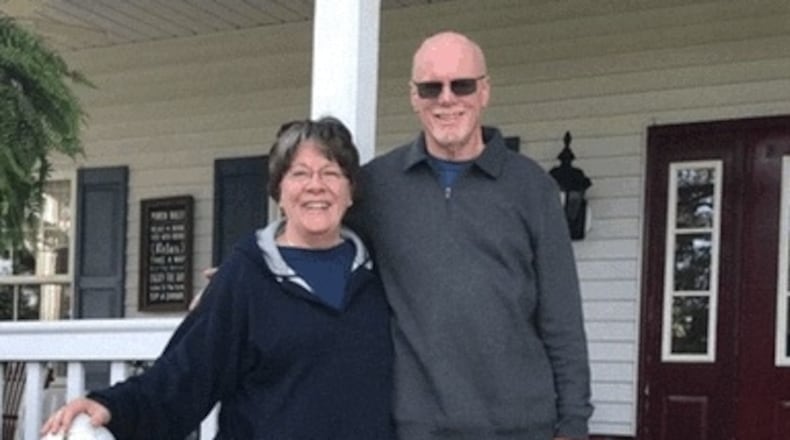On June 24, Ragle underwent deep brain stimulation surgery at the University of Cincinnati Medical Center.
“There’s very little that I can’t do right now,” Ragle said. “I played tennis this morning and I am playing pickleball tomorrow.”
In DBS surgery, electrodes are inserted into a targeted area of the brain, using MRI and recordings of brain cell activity during the procedure, according to the Parkinson’s Foundation. A second procedure implants an impulse generator battery under the collarbone or in the abdomen. The battery provides an electrical impulse to a part of the brain involved in motor function. Ragle said 10 days after his surgery they turned the battery pack on.
“My wife says immediately when they turned it on, she could see the tremors go away,” Ragle said. “My tremors have almost all gone away.”
DBS surgery was experimental until about 10 years ago. Ragle said he found out about the surgery from is daughter-in-law. He and LuAnn, his wife of 34 years, considered the option as his symptoms worsened over time.
“I had heard of it before, but I thought it was a last ditch effort to get some quality of life back. She explained it to me more fully and then I went to see my neurologist and she said I would be a good candidate,” Ragle said.
Ragle said because of the coronavirus pandemic, his surgery had to be rescheduled three times. He called it a fairly low-risk procedure and said he has not had any negative side-effects from the brain surgery.
It took Ragle about a month to recover from surgery.
“The surgery scrambled my brains for a while. I was not quite with it, for example, couldn’t work my phone or couldn’t figure out how to turn on the TV, but that resolved itself after a month or so,” he said.
Ragle said he “was in very bad shape before the surgery.” He hadn’t been able to play the guitar since 2013 at his son’s wedding.
“I wasn’t back at same level I was before, but my fingers weren’t the problem anymore it was just a lack of practice,” Ragle said.
Before the surgery, Ragle said he was functional at best.
“It (Parkinson’s) was just beginning to impact teaching last spring. I had trouble remembering how to do simple problems, things I had done for years. I had to think through them for a few minutes. It was becoming more challenging,” he said.
Ragle said he thinks his diagnosis with Parkinson’s and the surgery are all part of God’s plan.
“The Lord frequently uses trials in our lives. The first year I had this, I thought in terms of ‘Oh, woe is me. What’s going to happen? How can I have this?’” Ragle said. “But then I thought that he could either glorify himself by healing me or by letting me go through this thing and have people watching me go through this thing, giving me patience and whatever I need to get through it.”
Ragle said he and his family are currently assuming this DBS surgery is not a complete healing.
“But it is a very nice reprieve from what I had been living with,” he said.
Ragle urged people who have Parkinson’s who don’t know about this procedure to research it and talk to their neurologist about it.
“It has done wonderful things for me, I’m here doing all these things now that I couldn’t do before,” Ragle said.
About the Author


